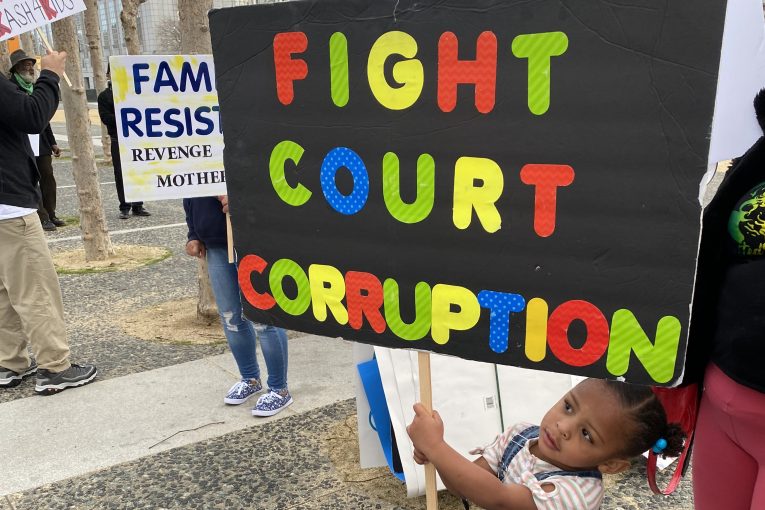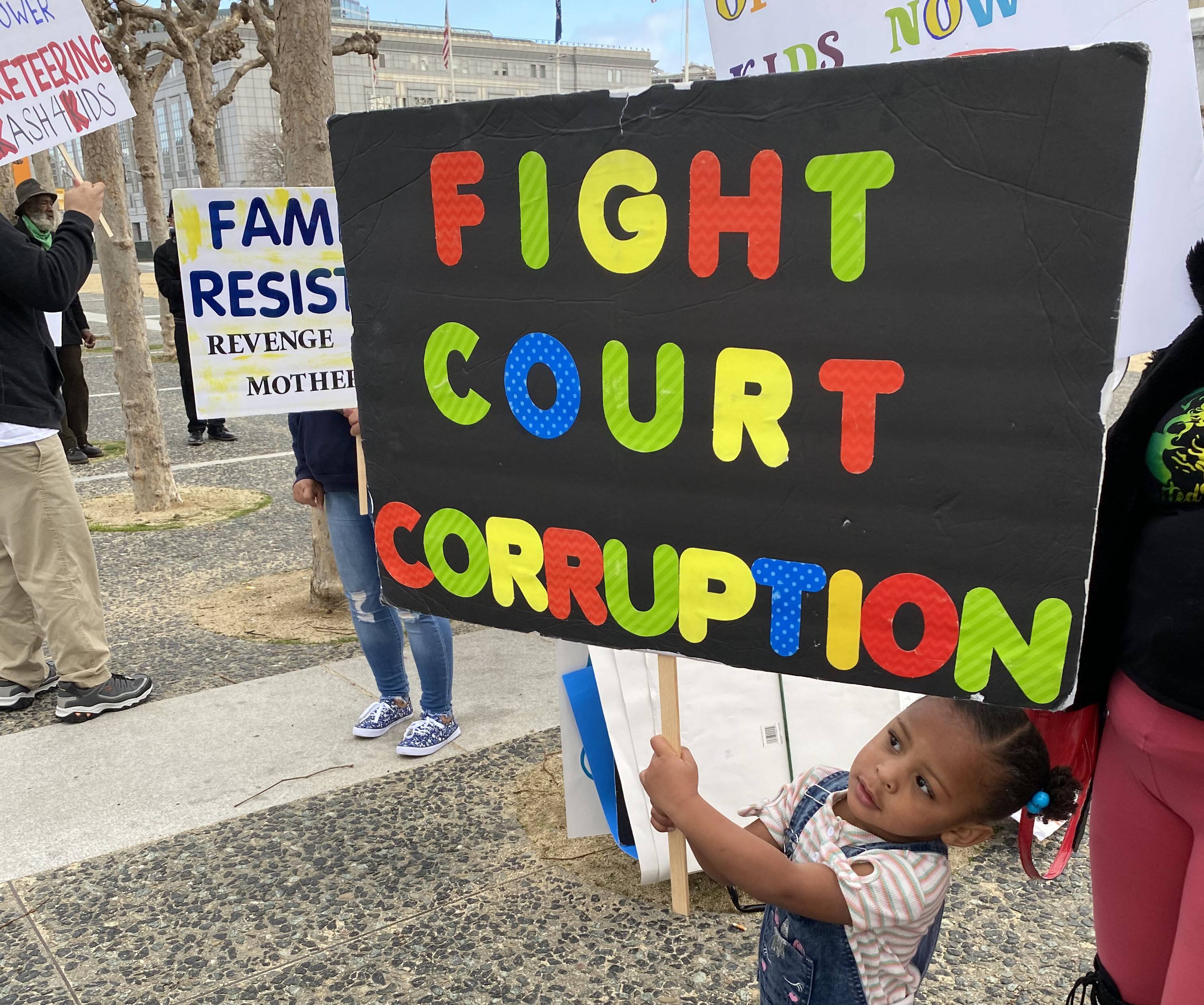

by Michelle D. Chan
Guest Commentary: Oppression is defined as the state of prolonged cruel and unjust treatment or control. Systems of family policing are overlooked by the general American public as a form of oppression because they operate under the guise of helping children and supporting families. Child Protective Services (CPS) and The Department of Child Support Services (DCSS) execute coercive and often absolute and unchecked control over their subjects, most commonly noncustodial parents and the children under their jurisdiction. The vast majority of those trapped in the Child Welfare/Foster Care system and those criminalized and marginalized due to Child Support debt committed no crimes to end up in these systems.
Victims of family policing are afforded far less rights or recourse than their counterparts in the criminal justice system. Once trapped in these systems, these innocent victims often have nowhere to go and very little social support.
The Panic, Desperation, and Deadly Flight of the oppressed …….
Walter Scott, Ma’khia Bryant, and Felicia Brent-Velazquez never met. But they are tied together by the commonality of their plights, struggles, and attempted flight from the systems of family policing that had absolute and unrelenting control of their lives. They are all dead now as a direct result of the panic and desperation that took hold of them in the moments before their deaths. They all wanted nothing more than to escape from their situations. And for all three of them, escape and justice and freedom was an illusion.
Walter Scott was a noncustodial father and fugitive of the law due to crippling and insensitive child support obligations. He owed over $18,000 in child support debt and had a warrant issued for his arrest as a result of this unpaid debt. On April 4, 2015 in a parking lot in North Charleston, South Carolina, Scott was pulled over by local police for a nonfunctioning brake light. Scott’s attempt to flee on foot and subsequent death by police shooting was captured on video by a bystander, and the senselessness of his murder gripped the nation in its aftermath.
Ma’Khia Bryant was a 16 year old under the supervision of Clark County Children’s Services, trying  desperately to escape from her circumstances. On April 20, 2021 she called 911 begging for help. “I want to leave this foster home,” she said. According to reports, she was “irate” and “brandishing a knife” by the time cops arrived on scene. Bryant was shot dead by the cops. Unlike the cell-phone camera footage documenting Scott’s death, the bodycam footage of Bryant’s shooting garnered little public sympathy because of her mental health state at the time.
desperately to escape from her circumstances. On April 20, 2021 she called 911 begging for help. “I want to leave this foster home,” she said. According to reports, she was “irate” and “brandishing a knife” by the time cops arrived on scene. Bryant was shot dead by the cops. Unlike the cell-phone camera footage documenting Scott’s death, the bodycam footage of Bryant’s shooting garnered little public sympathy because of her mental health state at the time.
Felicia Brent-Velasquez was living in group homes and under the supervision of Sacramento Child Protective Services (CPS) when she ran away from the institutional foster care placement she refused to call home. A week later while still on the run, she was ejected from the back of a speeding vehicle and gravely injured and permanently maimed. 19 months later at the age of 19, she died of an aneurysm related to the injuries she sustained in the car accident.
How does a person escape from a situation that they had no control over to begin with? Scott was not a hardened criminal but rather criminalized by poverty. And, Bryant and Brent-Velasquez were sentenced to live out their teens in group homes that felt much like prisons to them. Bryant and Brent-Velazquez committed no crime to end up in the foster care system, but were treated like criminals when they attempted to flee.
The panic, desperation and attempted flight of Scott, Bryant, and Brent-Velazques is an indication of the incredible and extreme duress and oppression exerted upon families, noncustodial parents, and youth under the jurisdiction of child protection, foster care and child support systems.
It is time for us as a nation to challenge prevailing assumptions that family destruction and the criminalization of poor, noncustodial parents strengthens communities and improves outcomes for children. Family policing is no more than a means for the government to oppress and control poor communities and communities of color.
Title IV of the Social Security Act and Criminalization of Parenting and Poverty
The criminalization of poverty and persecution of the poor is written into the very statutes governing the child support and child protection systems: Title IV-D and Title IV-E.
Walter Scott ran from police because of the warrant out for his arrest for unpaid child support. Ma’Khia Bryant and Felicia Brent-Velasquez wanted nothing more than to be freed from the confines of foster care imprisonment. It is my strong opinion that both teens should never have been removed from their biological homes to begin with.
Child support in America was developed in 1975 as an attack on the so-called “deadbeat dad” and “welfare queen.” The federal government wanted to alleviate child poverty, but it didn’t want to pay for it. Title IV-D of the Social Security Act was developed to recoup the cost of public welfare, without any consideration of sympathy for the noncustodial parents who would bear the burden. Punitive child support policies were developed based on racist and classist stereotypes of “deadbeat dads”
In 1997 the Adoption and Safe Families Act (ASFA) made sweeping changes to Title IV-E of the Social Security Act that shifted the priority of the child welfare system from preserving families to “child safety” and “permanency”. ASFA created perverse incentives from the federal government for states to destroy families and adopt children out. Many critics of the child welfare system believe that Title IV-E incentives place a price tag on children’s heads and lead to the aggressive and often unnecessary removals and adoptions of children. In Ma’khia Bryant and Fellicia Brent-Velazquez’s cases, their mothers never stopped fighting for them. It is hard for me to believe that these families were given a fair chance to stay together or to reunify, given what I know about their mother’s fierce battles to bring the girls home. It is clear also from the events leading to their deaths, that the girls also wanted to go home. Moreover, most children are removed from their homes due to neglect, not abuse. And neglect, as it is defined in ASFA encompasses many of the symptoms of poverty such a housing instability, inadequate supervision, insufficient food or improper clothing.
Families Resist: Parenting & Poverty Justice Rally
On Saturday, October 29, 2022, the Parenting & Poverty Justice Rally will bring impacted families from all across California together with allied organizations and sympathetic stakeholders and legislators to demand an end to family policing. The rally is sponsored by California Families Rise, the Truth and Justice in Child Support Coalition, Sacramento Homeless Union, Salinas/Monterey Homeless Union, California Justice, and Operation Stop CPS. The rally organizers are demanding: (1) keep families together in CPS and Family Court; (2) family services provisions for families with CPS-involvement, including but not limited to family stabilization, family reunification and advocacy, resourcing, transportation, transparency, free visitation, and housing stability; (3) full pass through of child support dollars to custodial parents receiving public benefits; (4) cancellation of all government-owed child support debt.
To find out more about the rally and to register, visit www.FamiliesResist.com. We may be able to provide transportation assistance to registrants who need it.
Michelle D. Chan is a writer, vlogger, mother, parents’ rights activist, and founder and director of California Families Rise. To find out more about our efforts or to join our cause, visit www.CaliforniaFamiliesRise.com or email CaFamiliesRise@gmail.com.





